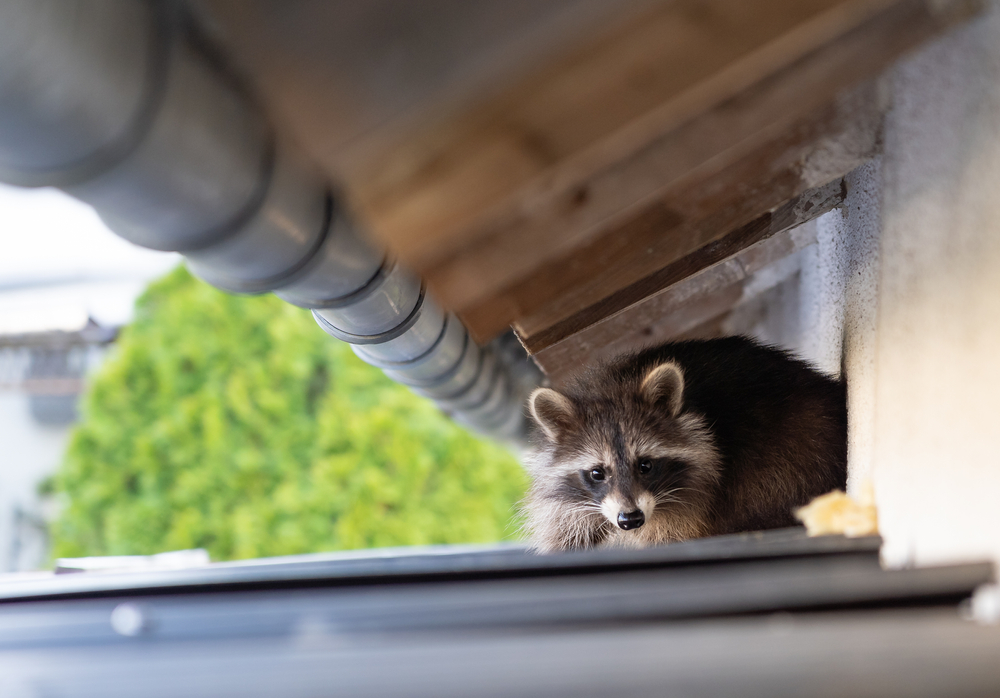My warm August day had started out just fine. Work had gone well, dinner was cooked, the kitchen was clean. It was about 7:30pm and I had just finished helping my son with his bath. The sliding back door was open to let the warm summer breezes waft through the house, but as usual, the screen door was closed to keep the bugs out. Or at least I thought it was.
As I walked into the kitchen, I saw to my horror that a large raccoon was eating out of my cats’ bowl. Stunned into submission, I stared at the raccoon for a few seconds before finally taking action by blocking her escape route into the rest of the house, and opening the patio door to the backyard. The animal proceeded to get stuck between the patio door and my freezer but I was able to open the glass door against which she was stuck and get her out of my house.
This happened two more times before I was able to figure out how the animals were getting into my house. In my case, they were opening the screen door and sauntering on in. Many homeowners however, find themselves living unknowingly with wildlife and other vermin because they are gaining entry into the home through openings the homeowner is unaware of. So, what to do if you find that you’ve got a pest or wildlife problem?
First of all, don’t panic. Assess your situation. Has the animal invaded your home, or is the animal in distress outside of your home? Check out the Pests and Wildlife page of your local government to find out which solution is required for your problem.
If you have an animal in distress on your property, most cities will have a wildlife rescue service that can be called upon to help remove the animal safely and humanely.
If you have an animal (or a family of animals) in your house, it is best to call a professional right away to help. Our database tells us that on average, Canadians spend about $650 when dealing with a pest or wildlife problem.
This may be money well spent as there are many risks associated with having wildlife in your home, so do not delay in their removal:
1. Disease
Raccoons and rodents in can carry several dangerous diseases including roundworm and leptospirosis which can be transmitted to humans and pets.
If a raccoon has roundworms, the eggs are shed in the raccoon’s feces. These eggs can either be ingested or even inhaled. So, if you will be required to clean up raccoon feces, you must be very careful, and you should wear disposable gloves and a mask. Clean your hands and any other area on your body that may have come in contact with the animal feces, as raccoon roundworms can be deadly to humans if they enter the digestive tract.
Leptospirosis lives in contaminated soil and water, and it is a bacterial disease. Infected raccoons pass the bacteria in their urine. This disease is also rare in humans, but it can cause liver failure, kidney damage, and more. In some cases, it can cause death.
Of course, there is a tiny risk of rabies with any wild animal, so do be cautious when closely approaching any animal.
2. Property Damage
If you do not get rid of wild animals lodging in your home, you may find that their urine, feces and nesting habits cause significant damage.
Additionally, both raccoons and squirrels love fruit trees and will never miss chance to pick a nice, ripe piece of fruit, eat a few bites and throw it away for the ants and bees to attack. This can make a right mess of your property, and decrease your enjoyment of your backyard.
3. Your Pets
Raccoons have been known to attack dogs and cats, especially if cornered. Raccoons can easily kill cats and small dogs, and they can injure large dogs. Additionally, raccoon feces can contain roundworm, which can infect your animal if they ingest or inhale raccoon feces.
The primary squirrel health risk is linked to ticks and fleas which squirrels tend to be infested with. Ticks carry the danger of tick fever and, once carried into your home by squirrels, may also infest your household pets.
Fleas are also associated with squirrels and may also take up residence in your family pet – and once a flea or tick infestation has begun it is notoriously difficult to get rid of as these microscopic insects take up residence in carpets, soft furnishings and furniture.
Having an animal gain entry into your home is never a good situation, but do not despair, there is help and a solution to your problem. If you need to find a trusted animal or pest control professional, start by reading reviews on HomeStars. And when the job is done, please do consider writing a review, it helps the whole community!
